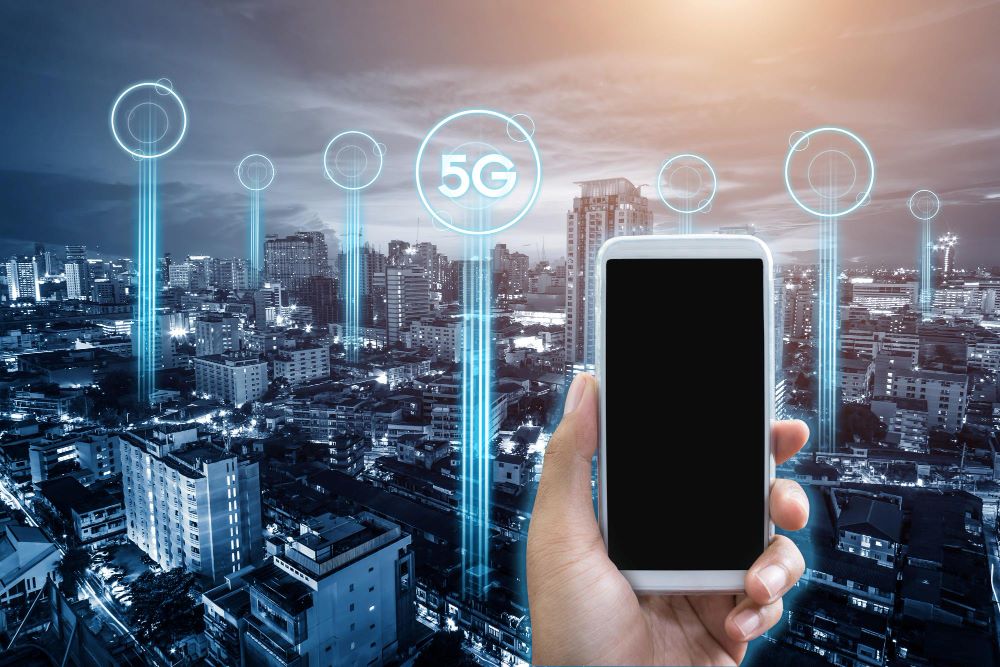Unleashing the Power of 5G: Revolutionizing Mobile App Development
In the realm of mobile app development, the arrival of 5G technology marks a significant milestone, promising to unlock a new era of high-speed connectivity and transformative possibilities. As the world embraces the rollout of 5G networks, developers are poised to harness this unprecedented level of connectivity to create innovative and immersive mobile experiences. In this article, we’ll explore the potential of 5G in mobile app development and how it is poised to revolutionize the industry.

Understanding the Impact of 5G on Mobile App Development
5G, the fifth generation of wireless technology, promises to deliver faster speeds, lower latency, and greater capacity than its predecessors. With speeds up to 100 times faster than 4G, and latency reduced to milliseconds, 5G enables a wide range of new capabilities and experiences that were previously impractical or impossible on mobile devices. From immersive augmented reality (AR) and virtual reality (VR) experiences to real-time gaming, ultra-high-definition video streaming, and IoT (Internet of Things) connectivity, 5G opens up a world of possibilities for mobile app developers.
Key Benefits of 5G in Mobile App Development
Ultra-Fast Speeds: With 5G, mobile apps can deliver content and services at blazing-fast speeds, enabling instant downloads, seamless streaming, and real-time interactions. This opens up opportunities for developers to create richer and more immersive experiences that were previously hindered by slow loading times and buffering.
Low Latency: 5G significantly reduces latency, the delay between sending and receiving data, to milliseconds. This enables real-time interactions and responsiveness in mobile apps, making it possible to create applications that respond instantaneously to user input, such as gaming, remote control, and IoT applications.
Enhanced Connectivity: 5G’s increased capacity and improved connectivity enable more devices to connect simultaneously to the network without experiencing slowdowns or congestion. This paves the way for the proliferation of IoT devices and applications, as well as collaborative and multiplayer experiences in mobile apps.
High-Bandwidth Applications: 5G’s high bandwidth capabilities enable the delivery of high-definition video, virtual reality, and augmented reality experiences on mobile devices. This opens up new possibilities for immersive storytelling, virtual tours, training simulations, and other high-bandwidth applications in mobile apps.
Potential Use Cases of 5G in Mobile App Development
Augmented Reality (AR) and Virtual Reality (VR): 5G enables seamless streaming and rendering of high-definition AR and VR content on mobile devices, opening up new opportunities for immersive gaming, entertainment, education, and training experiences.
Real-Time Gaming: With 5G’s low latency and high speeds, developers can create multiplayer and cloud gaming experiences that rival traditional console and PC gaming, enabling gamers to play high-quality games on their mobile devices from anywhere.
IoT Connectivity: 5G’s enhanced connectivity and capacity make it ideal for IoT applications, enabling a wide range of connected devices and sensors to communicate and exchange data in real-time. This opens up opportunities for smart homes, smart cities, industrial automation, and other IoT-enabled applications in mobile apps.
Remote Collaboration and Communication: 5G enables high-quality video conferencing, streaming, and collaboration experiences on mobile devices, allowing users to communicate and collaborate with colleagues, clients, and friends in real-time from anywhere.
Best Practices for Leveraging 5G in Mobile App Development
Optimize for Speed and Performance: Take advantage of 5G’s ultra-fast speeds and low latency to deliver high-quality, high-performance experiences in your mobile apps. Optimize your app’s code, assets, and network requests to minimize loading times and maximize responsiveness.
Design for Immersion and Interactivity: Leverage 5G’s capabilities to create immersive and interactive experiences that engage users and keep them coming back for more. Incorporate features such as AR, VR, real-time multiplayer, and live streaming to create compelling and memorable experiences in your mobile apps.
Prioritize Security and Privacy: Ensure that your mobile apps are secure and compliant with privacy regulations to protect user data and sensitive information. Implement encryption, authentication, and access controls to safeguard user privacy and prevent unauthorized access to data.
Test Across Networks and Devices: Test your mobile apps across different networks, devices, and locations to ensure optimal performance and compatibility with 5G networks. Consider factors such as network coverage, signal strength, and device capabilities when testing your apps to deliver a seamless experience to all users.
Conclusion :
5G technology is poised to revolutionize mobile app development, enabling developers to create faster, more immersive, and interactive experiences than ever before. With its ultra-fast speeds, low latency, and enhanced connectivity, 5G unlocks a world of possibilities for mobile apps, from augmented reality and virtual reality experiences to real-time gaming, IoT connectivity, and remote collaboration. By embracing 5G technology and leveraging its capabilities, developers can create innovative and compelling mobile experiences that engage users and drive business growth in the 5G era.
